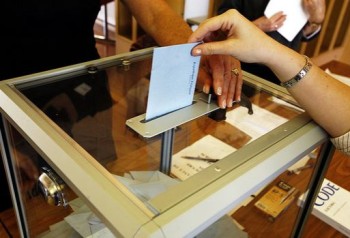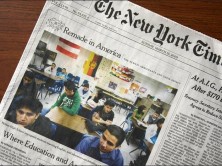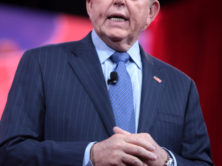
According to the Associated Press, a new poll shows that most Americans feel “frustrated,” “helpless,” and “angry,” and that they want the presidential nomination system changed. However, the link between voter malaise and desire for changes is at best tenuous. And whatever the reasons for the discontent, the proposed changes in the nomination process would almost certainly make no difference.
After pointing out that “Americans are not happy with the way presidential candidates are chosen,” the AP reporters assert:
“According to the survey, the public prefers open primaries to those that are closed to all but party members. They like primaries instead of caucuses, and they oppose the party insiders known as superdelegates, who have a substantial say in the Democratic race.”
First, it’s important to realize that democracy is a messy business. The more people see it in action, the less attracted they are to it. There’s too much controversy and too many people are disagreeing with each other. That’s especially true for Congress, where Republicans and Democrats are in constant conflict as part of the legislative process. But most people don’t see this as democracy-in-action, but rather as legislators not-getting-along. And that’s why, even in times when there is less governmental stalemate than there is now, Congress always gets lower poll ratings than either the president or the Supreme Court.
So, a poll like the one by AP-NORC, in the midst of the nomination process – when the conflict is not just between political parties, but within the parties as well – is virtually guaranteed to produce the appearance of an unhappy electorate. And the poll report doesn’t provide any context for the many measures – are they higher or lower than usual, for example, or is this just the normal state of affairs during an election campaign?
Second, the poll does not really ask people if they want changes. Instead, it asks them how they feel about the process and, not a surprise (!), the process is messy and the people aren’t happy. But do the people have any idea what process might be better? The poll doesn’t really address this issue.
Changes in the Nomination Process: Open vs. Closed Primaries
The poll asks three questions, the responses to which imply the public may want a change. The first asks:
“Which do you think is a more fair way to select a nominee?
69% “open primaries and caucuses where any registered voter can participate in either party’s primary or caucus, or
29% “closed primaries and caucuses, where only voters who are registered in a party can participate in that party’s primary or caucus?”
2% (don’t know/refused)
As the percentages indicate, most people say the open primaries are “more fair.” We can’t really trust the results of this question, however. It’s a sure bet that most people haven’t given this idea much thought, so when the question raises the norm of fairness in this way, it’s quite predictable that people would want a more inclusive than exclusive process.
But suppose the question were changed to read: “Do you think voters who don’t support a political party should be allowed to help choose that party’s nominee, or should only the people who identify with the party be allowed to do so?”
The above question raises a different norm – of ownership. And, I suspect, the results would reveal a different opinion on the issue of open primaries, with most people feeling that members of a party have an exclusive right to elect their own leaders.
In any case, the issue of open primaries is pulling the parties in opposite directions. Bernie Sanders called the Democratic Party’s nomination system rigged, in part because of the closed Democratic primaries in many states, and is pushing to allow non-Democrats to vote in Democratic contests. By contrast, GOP leaders are leaning in the opposite direction, concerned that open primaries allow too many voters who don’t share the Republican conservative philosophy to influence the nomination process (and vote for Donald Trump).
What do party members prefer? We don’t really know. No doubt the responses would be influenced by the way the issue is presented to them. Besides, it’s not up for a general vote by either party, so measuring views of voters unengaged in the issue will hardly matter.
Changes in the Nomination Process: Super Delegates
Another change supposedly desired by voters (not just Democrats) is the elimination of super delegates in the Democratic Party. (Yes, AP-NORC asked even independents and Republicans whether the Democratic Party should include super delegates.) The existence of such super delegates is another reason Sanders has claimed the process is rigged. But it’s a red herring, as has been pointed out in numerous news stories. The super delegates have never overridden the winner of the pledged delegates. In theory they could, but they haven’t. And if they stick with Clinton, they won’t this year either.
Ironically, it is Sanders who has been trying to get the super delegate to switch to him in order to override the winner of pledged delegates (Clinton), because of hypothetical poll matchups suggesting he might do better against Trump than Clinton. That may explain why he has recently backed off from calling the nomination system rigged, instead saying it’s just “dumb.”
Changes in the Nomination Process: Primaries vs. Caucuses
Finally, the last change apparently desired by the public is to eliminate caucuses in favor of primaries. But that’s not what the question measured. It asked which system was “more fair”, with 81% saying primaries and 17% caucuses.
Most states already have primaries, and the question didn’t ask if it was okay if some states had caucuses and others had primaries. But it’s highly likely that a question could be designed to get public approval: Do you think individual states should be allowed to decide whether to have a primary or a caucus, or do you think all states should be forced to have primaries?
Again, the way the issue is presented to the public is likely to have a significant impact on what respondents tell interviewers.
The So-Called Disconnected and Helpless Public
While AP-NORC are promoting the idea of a “disconnected” and “helpless” electorate in 2016, and linking those feelings to specific changes in the nomination process, there is no evidence to suggest such changes would improve the electorate’s mood.
Suppose there were no super delegates in the Democratic Party. Since they haven’t voted yet, and are virtually certain not to override the winner of the pledged delegates, it’s hard to see how the electorate would be any happier than it is now.
Suppose all primaries were “open.” According to 538.com, Sanders would still be in second place. And he would still be complaining the system was rigged. Or “dumb.” The anti-Trump leaders in the Republican Party think they already have too many open primaries. And that hasn’t made them or their GOP members happy.
Suppose there were no caucuses, but all primaries. Nothing in either party would be substantially different from what it is now. If anything, Sanders might be a bit worse off, causing him to complain even more about a rigged system. There’s nothing here to suggest Democrats would be happier if all caucuses had been primaries.
The “disconnected” and “helpless” public that exists now (according to the AP-NORC poll) may be the natural state of an electorate during any presidential primary season. We don’t know. The AP-NORC report presents no comparative data to enlighten us.
If the public’s malaise is different from other years, it may be caused not by specific procedures in the nomination process, but by the two major outsiders in each party – Sanders and Trump – who have both claimed their party’s nomination system is rigged. Their followers may not know why exactly those claims are being made, but they listen to their preferred candidate.
So, what to make of this AP-NORC poll:
Are most Americans disgruntled with the nomination process? They may be disgruntled, but probably not with the specifics of the process, and instead with the very conflict that is evident among the candidates.
Would instituting all open primaries, and getting rid of caucuses and super delegates make Americans happy with the nomination process? Let’s get serious!







Comments Terms and Conditions